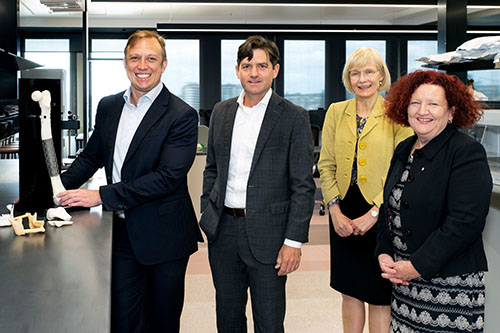Partnership ignites new medical R&D Lab
A specialised medical research facility that will transform ground-breaking research into new medical equipment and technology is set to be established in Queensland, at the Herston Health Precinct.
Global medical technology group Stryker will establish its first Australian research and development facility in Queensland, thanks to support from the Queensland Government, The University of Queensland and Queensland University of Technology.
UQ Vice-Chancellor Professor Deborah Terry said Stryker was internationally recognised for its high-quality medical products, equipment, services and innovation.
“Their products and services help to improve the health care and health outcomes of people all over the globe, every day,” Professor Terry said.
“UQ is highly regarded for its medical innovation and is ranked 7th in biotechnology research globally and we are proud to support Stryker in establishing their first Australian R&D facility.
“The fact that Stryker has chosen Brisbane is a testament to the important recognition of our world-leading research capability in the areas of medical technology and orthopaedics.
“This is a terrific example of how researchers, industry and government really should be collaborating to drive innovations that will contribute to the diversification of our industrial base and the growth of the Queensland economy.”
Head of Queensland Digital Health Research Network, UQ’s Associate Professor Clair Sullivan, said The University of Queensland was investing in world class digital health capability.
 “With the establishment of this new R&D lab, we now have a global corporate partner on our doorstep, with the resources and the scale to help transfer our leading research into real-world outcomes,” Assoc Prof Sullivan said.
“With the establishment of this new R&D lab, we now have a global corporate partner on our doorstep, with the resources and the scale to help transfer our leading research into real-world outcomes,” Assoc Prof Sullivan said.
“Together, we will lead change in Queensland, and globally via a powerful, comprehensive and contemporary health research capability, while at the same time harnessing UQ’s clinical, public health and data science expertise.
“Through this partnership, we will be able to build infrastructure to drive globally significant research, healthcare innovation and improved patient and population health outcomes over the next decade.”
UQ will be looking to collaborate with Stryker across a range of areas, including the development of new bio-materials, orthopaedics, infection control, stem cell technologies, wound healing, medical imaging , digital health and tissue growth.

